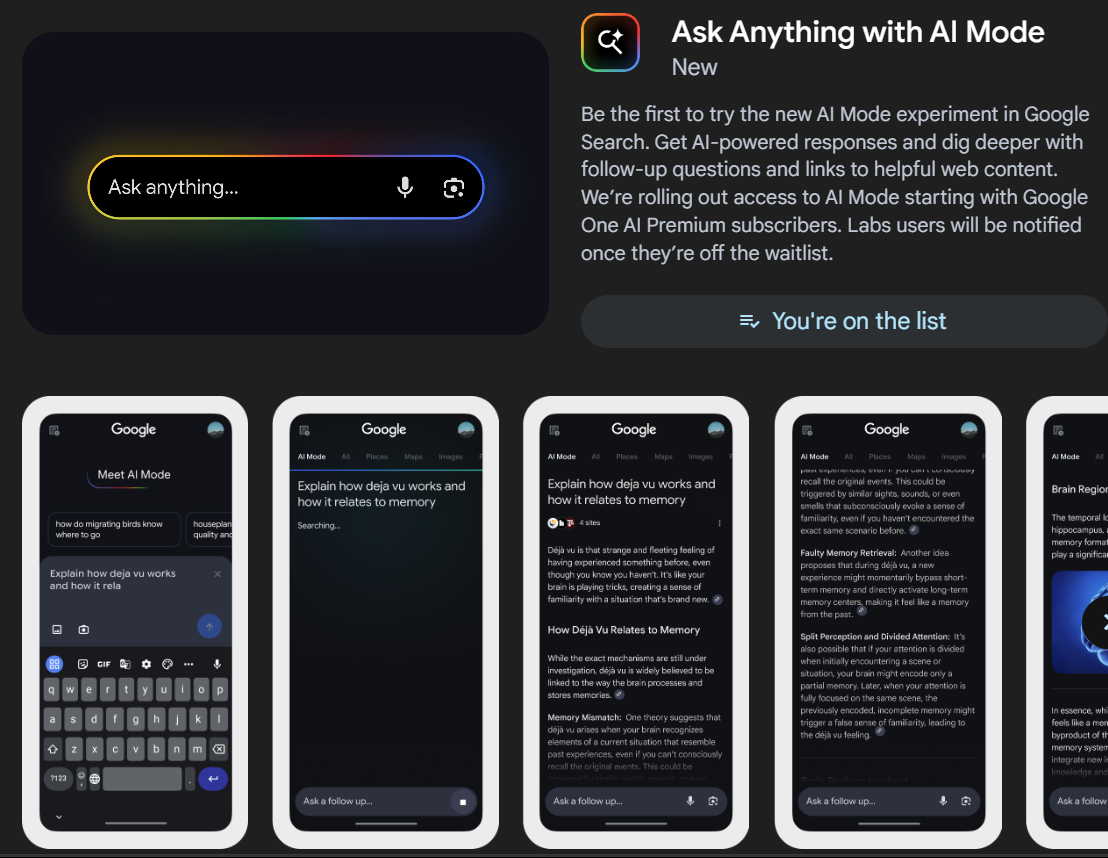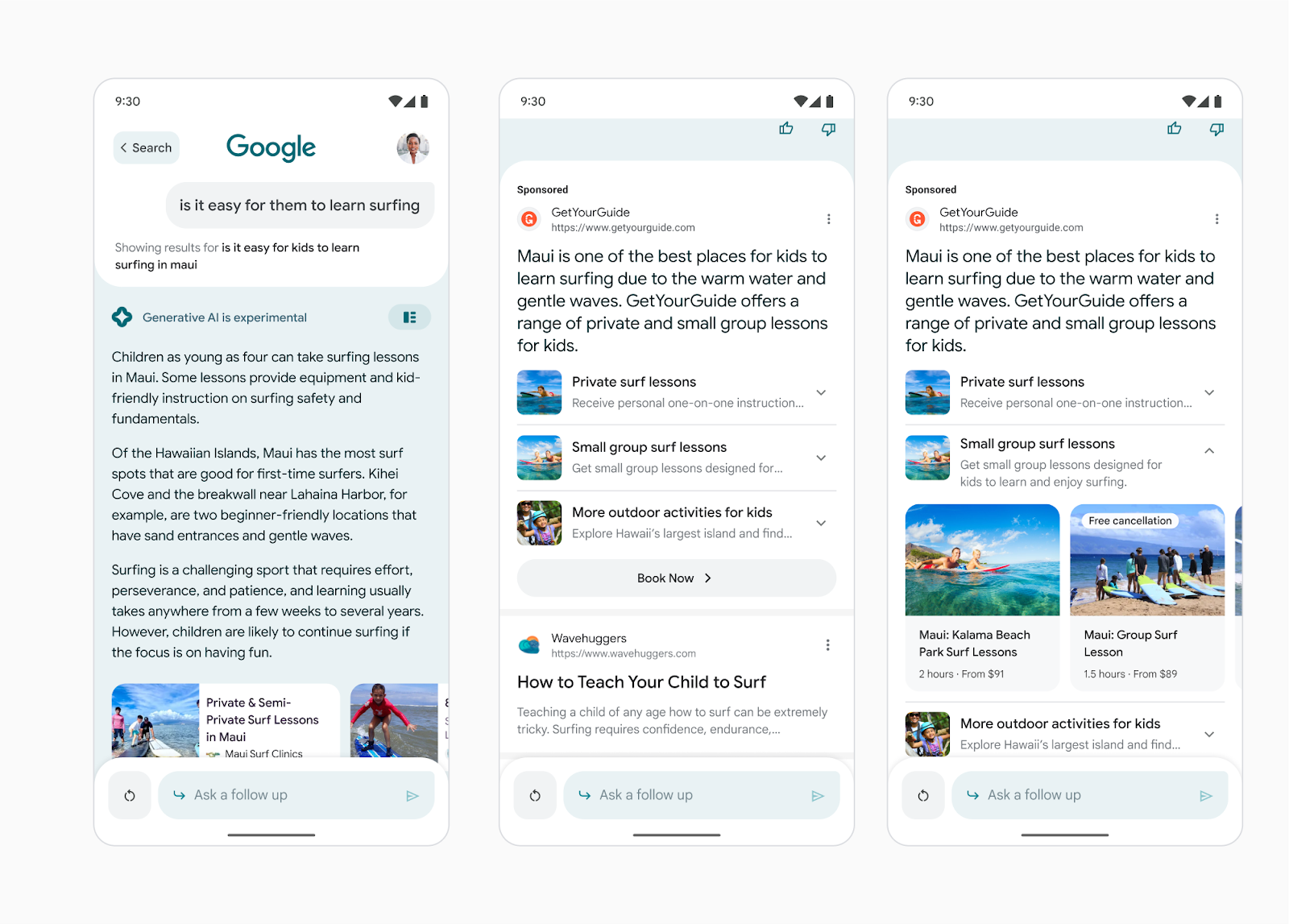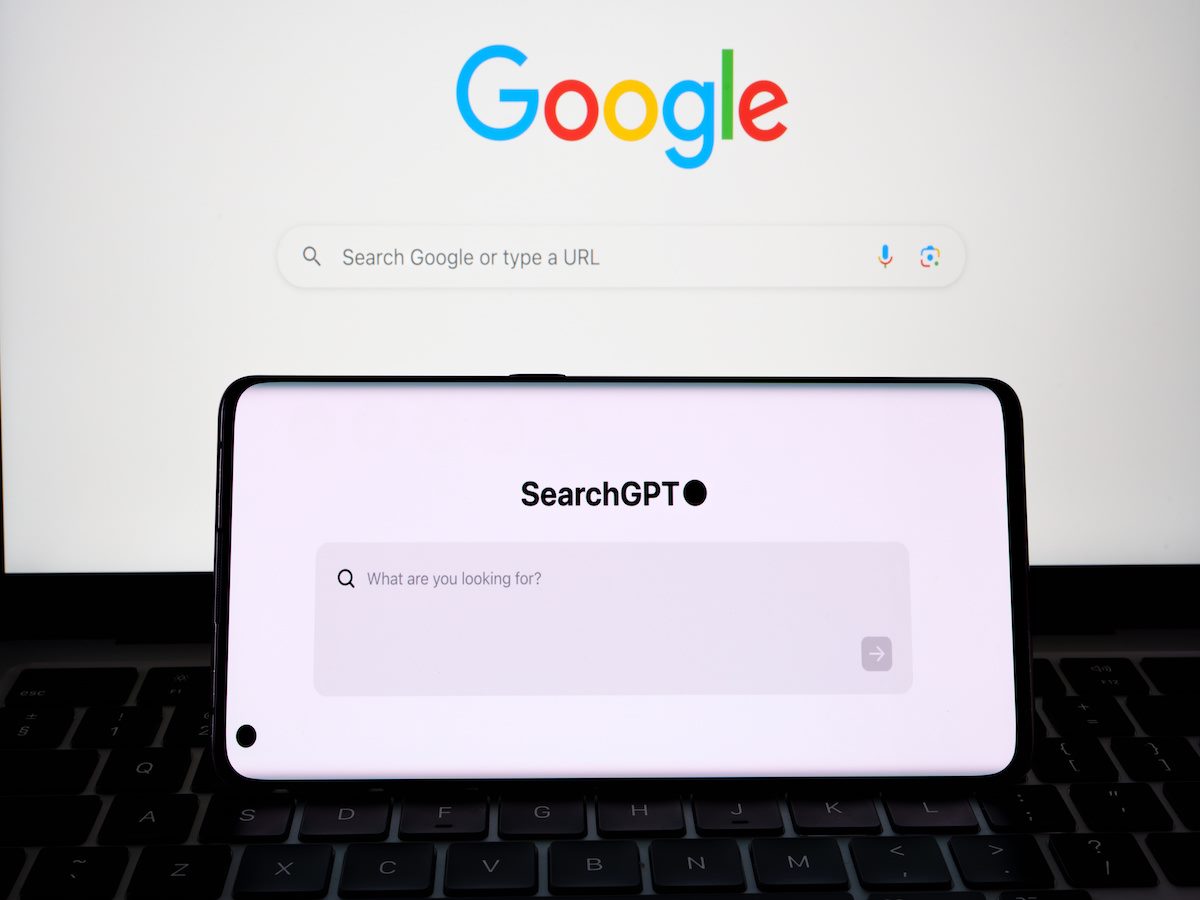Google's AI Mode represents a significant change in search technology, enabling users to receive comprehensive, AI-generated responses to complex, multi-part queries.
Using the advanced capabilities of Google’s Gemini model, AI Mode brings together information from various sources to provide detailed answers, moving beyond traditional search methods that often present a list of links or brief summaries. This functionality promises to enhance the user experience by delivering more personalized and contextually relevant information.
Google's AI Mode vs Traditional Search
Traditional search engines (like classic Google Search) rely on keyword matching, ranking algorithms and indexed web pages to serve up links. But AI search changes the game by offering contextual understanding, generative responses and personalized results — all within a conversational format. It’s search and synthesis in one.
Here’s how AI search is different from legacy search:
- Conversational Interaction: You’re not just typing keywords anymore — you’re having a dialogue. You can ask follow-up questions, refine your queries or change topics, and the AI keeps track of the context.
- Generative Answers, Not Just Links: AI search tools like ChatGPT, Gemini and now Google’s AI Mode don’t just point you to a website — they generate full-page responses or concise answers based on multiple sources.
- Multimodal and Multistep Capabilities: Modern AI search can handle images, charts and multi-part questions. Ask, “Plan a three-day trip to Rome including vegan restaurants, museum hours, and average weather,” and it’ll synthesize all that into a single response. That’s what Google is now aiming for with AI Mode.
- Personalization at Scale: AI search is getting better at personalizing results based on prior queries, preferences and even user behavior. You and I might type the same question, but get very different answers depending on context and history.
- Source Transparency and Trust: Users increasingly expect to see where answers come from. One challenge with generative search is providing citations. Google, Bing and others are still working on making sourcing more transparent in their AI-generated results.
Related Article: OpenAI’s Operator in Action: What It Can — and Can’t — Do
Why Users Prefer AI Over Traditional Search
One Gartner report revealed that search engine volume will drop 25% by 2026, with search marketing losing market share to AI chatbots and other virtual agents.
Alan Antin, VP analyst at Gartner, said in the report that "Generative AI solutions are becoming substitute answer engines, replacing user queries that previously may have been executed in traditional search engines. This will force companies to rethink their marketing channels strategy as GenAI becomes more embedded across all aspects of the enterprise."
Many users now prefer seeking answers via AI because:
- It saves time by avoiding the "click-and-skim" loop
- It gives more concise and goal-driven answers
- It helps tackle complex, layered questions — things classic search engines can’t easily handle
Traditionally, Google Search has been built around providing a ranked list of links. But with the rollout of AI Mode, the company is moving toward full-page, AI-generated responses that synthesize and summarize content — bringing more context and clarity to complex queries.

AI mode will introduce a significant shift in how users interact with Google Search, where instead of digging through links, they’ll be presented with natural language answers, actionable insights and multimodal elements directly on the search results page.
How Google's AI Mode Works
At the core of Google’s AI Mode is its integration of generative AI into the search experience — moving beyond the traditional model of returning ranked hyperlinks. Instead of presenting users with a list of sources, AI Mode generates a cohesive, full-page response that synthesizes information, directly answers questions and often includes visuals and suggested next steps.
| Feature | Traditional Google Search | Google AI Mode Search |
| Response Format | Ranked list of links | Full-page, AI-generated response |
| Query Handling | Single step, keyword-based | Multi-step, intent-driven reasoning |
| Data Sources | Individual websites (users must visit each) | Aggregated from multiple sources and summarized |
| User Effort | High — Requires scanning and comparing results | Low — Answers provided in a consolidated format |
| Visual Elements | Snippets, thumbnails | Lists, images, charts, inline tools |
| Context Awareness | Limited context retention | Enhanced context tracking across complex queries |
| Ideal For | Quick lookups, known sites | Exploratory queries, comparisons, synthesis of ideas |
This shift is made possible by multi-step reasoning, a capability that has been enhanced in the Gemini 2.5 model. AI Mode can handle complex, layered queries — such as “compare hybrid SUVs under $40K with high safety ratings and good winter performance” — and return a single, structured answer that draws on multiple data points. Rather than relying on users to sift through ten blue links, AI Mode interprets intent, processes subtasks and generates a direct response in natural language.
To do this, the system gathers and processes data from across the web, including structured data, trusted content sources and real-time information where applicable. The result is a fluid, conversational search experience that more closely resembles interacting with an intelligent assistant than using a keyword-based search engine. For enterprise users, this means faster access to synthesized insights — particularly useful for research and decision-making.
“With AI Overviews in Search, it’s easier than ever for people to find the information they need and discover relevant sites across the web, which opens up more opportunities to connect with publishers, businesses and creators,” Srinivasan Venkatachary, VP of search quality at Google, said in a blog post.
While AI Mode introduces generative summaries to Google, some users may find it lacking when compared to AI-first experiences like Gemini’s Deep Research tool.
David Erickson, senior director of AI and emerging technology at Tunheim, shared his experience with Google's AI mode. "Gemini Deep Research actually gave me a useful document I could review and use… AI Mode told me how to go about doing the research but Gemini actually did the research for me." Erickson said he views AI Mode as still grounded in traditional search behaviors, while newer tools are taking a bolder step toward autonomous content discovery.
Related Article: The Impact of Generative AI on Traditional Search Engines: A Deep Dive Into OpenAI’s SearchGPT
Key Features of AI Mode
Google’s AI Mode marks a leap forward in how users engage with information by bringing conversational intelligence and contextual depth into the search experience. However, it’s worth noting that OpenAI has been offering AI-powered search capabilities since late 2022 through ChatGPT, with browsing and research functions becoming increasingly sophisticated.
Millions of users have since adopted ChatGPT as their default research companion — a trend that helped normalize conversational search long before Google integrated it into its core product. What Google is doing now is effectively merging that style of interaction into the search engine millions already use every day. Rather than jumping between websites, users can now receive comprehensive answers in one go, changing both user expectations and content visibility.
One of the standout features of Google's AI Mode is contextual awareness. AI Mode doesn’t just respond to keywords — it interprets the underlying intent of multi-part queries, enabling it to deliver more nuanced, relevant results. Whether users are exploring a complex topic or simply comparing product options, AI Mode recognizes subtleties in phrasing and adjusts its answers accordingly.
It also excels at summarization and synthesis, generating structured, multi-paragraph responses that draw from multiple credible sources. Instead of requiring users to click through dozens of links, AI Mode weaves together a coherent narrative or argument, often including bullet points, lists or concise takeaways.
Another key advantage is follow-up capability. Users can continue the conversation by asking clarifying questions or requesting additional details, and AI Mode responds with continuity — maintaining context across multiple queries within the same session.
Finally, visual integration adds a dynamic layer to the experience. AI Mode incorporates relevant media directly into the generated response, offering both textual insight and visual reinforcement. This transforms search from a link-based journey into a rich, interactive knowledge experience.

Potential Limitations of AI Mode
While Google’s AI Mode offers an innovative leap in how users engage with information, it also introduces a range of potential pitfalls that both users and publishers will need to deal with.
One of the most pressing concerns is the risk of misinformation. Like all large language models (LLMs), Gemini can still generate hallucinated responses — plausible-sounding answers that are factually incorrect. Despite Google's ongoing efforts to refine accuracy through reinforcement learning and retrieval-based grounding, edge cases remain a challenge, particularly with emerging or nuanced topics.
Citing and attribution remain another area of scrutiny. Traditional search allows users to assess source credibility by visiting original pages. In contrast, AI Mode summarizes and synthesizes information, sometimes without clearly highlighting where specific data points originated. Google has committed to improving attribution with link previews and citations, but transparency around how sources are selected — and how much original content is generated — will be the key to maintaining trust.
Finally, privacy concerns are likely to intensify as AI Mode relies more heavily on personalized responses. While Google has built its AI systems with data security and anonymization in mind, users may still question how their search history, location and behavior are being used to personalize results. Ensuring robust privacy settings and clear communication will be crucial as generative search becomes more widespread.
How AI Search Is Disrupting SEO and Marketing
For marketers and businesses, the implications of AI search are substantial. As Google prioritizes AI-generated responses over organic listings, the traditional SEO playbook will need to evolve. Businesses could find themselves competing for inclusion in AI summaries rather than simply ranking in the top 10 links. This may lead to a shift in content strategy, placing greater emphasis on structured data, conversational content and brand authority signals that Google's AI models can easily surface and summarize.
The SEO implications are still unfolding. With AI-generated summaries occupying the top of the results page, organic traffic to publisher sites may decline — particularly for content that answers straightforward questions. This has prompted concerns among marketers and content creators, as the visibility of long-tail pages may diminish unless Google consistently cites and links to original sources within its responses.
AI-generated results are starting to reduce clicks on informational queries, though transactional searches still rely on classic link-based models. Jade Pruett, founder of HelloSEO, told VKTR that "We are already seeing a small dip in website traffic for information searches, meaning more people are getting their answers directly from the search engine results page (SERP) and not clicking into a blog to read more." Pruett believes this is a wake-up call for SEO practitioners to refocus on unique, expert-driven content that can't be easily summarized by AI.
The rise of AI-powered search also creates a new dilemma for content creators: their work may be summarized or paraphrased by AI systems without attribution or benefit.
"If AI-crawlers are taking all of that information and using it without the business owner getting anything in return," said Pruett, "those writers have no incentive to pack the internet with free, useful content anymore." She warned that this shift could lead to disincentivizing valuable content creation, especially among small businesses that rely on SEO for visibility.
The shift toward AI-first search could significantly disrupt SEO strategies. As AI-generated answers dominate above-the-fold space, publishers may see a decline in click-through rates — even for content that’s being paraphrased or referenced. This raises broader questions about content ownership, compensation and how publishers can adapt to remain visible within a more closed-loop search experience.
At the same time, advertising strategies may shift toward integration within generative results, creating new forms of contextual, AI-aware ad placement. Google has hinted at incorporating sponsored responses and AI-informed shopping results, which could reshape both paid and organic digital strategies over the next few years.
Related Article: The Impact of Generative AI on Ecommerce Search
What’s Next for AI-Driven Search
Google's AI Mode marks a big shift in information retrieval, moving beyond traditional link-based results toward intelligent, conversational discovery. As this technology matures, it is likely to redefine not just how we access information, but how we interact with digital knowledge — evolving search from a mechanical process into a dynamic, personalized dialogue.
